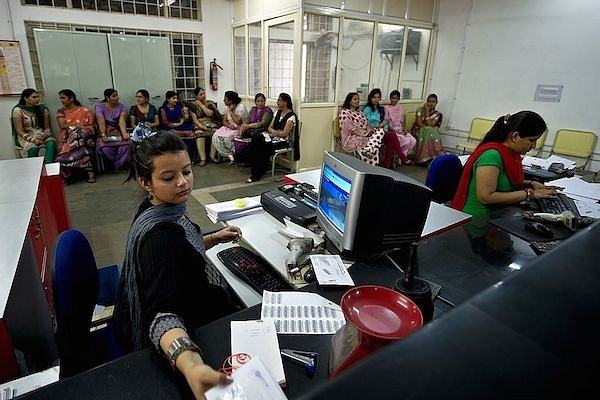Ideas
Is 26-Week Maternity Leave Really A Woman-Friendly Policy?
- This patriarchal mindset that babies are women’s work, for which employers and others must show indulgence, can only do harm in the long run.

Photo: MANAN VATSYAYANA/AFP/Getty Images
Even the best-intentioned ideas have not-so-good consequences. One such noble idea is to give maternal leave of up to 26 weeks for women, as against the existing 12 weeks— both in the public and private sectors. “Commissioning mothers”, i.e those who use surrogates to bear a child, are to get 12 weeks of leave. A bill to change maternity leave laws, along these lines, is being tabled by Labour Minister Bandaru Dattatreya today (9 August), says The Economic Times.
While it is always good
to give mothers more time with their newly-borns, the chances are that this change
will work against their long-term fight for equality in the workplace and
giving their partners an equal share of responsibility around the home and in
bringing up children. Without changing this outlook, gender equations will
never change for the better in a fundamentally patriarchal society.
The problem is not the length
of women’s maternity leave, but the lack of it for the partners in their lives.
Consider the cons of
giving such long maternity breaks only to women:
Two, it is surprising that “commissioning moms” get 12 weeks, but not commissioning dads. If a commissioning mom is not
going to breast-feed her surrogate-created baby, her partner (man or woman)
could equally take charge of the resultant post-commissioning baby. What rule
says that only the mom has to be the in-house parent in the first three months
after birth? Women may be temperamentally closer to nurturing roles, but isn’t
this what we are now trying to change? Why discriminate against willing dads in
the commissioning business?
Three, working out of home is
an option now being made available to women post-maternity. Again, why is this
available only to women? Even assuming maternity leave cannot be shared between
partners, surely working out of home can be an option available to new dads?
It shows a patriarchal
mindset that babies are seen to be women’s work for which employers and others
must show indulgence. This can only do harm in the long run. While women will
obviously bear the joys and burdens of pregnancy on their own, surely
post-pregnancy duties cannot be the woman’s work alone? But you won’t discover
this from official laws focused on making “women-friendly” laws.
Moving out of patriarchy means moving towards family-friendly laws, not women or man-friendly ones.
Introducing ElectionsHQ + 50 Ground Reports Project
The 2024 elections might seem easy to guess, but there are some important questions that shouldn't be missed.
Do freebies still sway voters? Do people prioritise infrastructure when voting? How will Punjab vote?
The answers to these questions provide great insights into where we, as a country, are headed in the years to come.
Swarajya is starting a project with an aim to do 50 solid ground stories and a smart commentary service on WhatsApp, a one-of-a-kind. We'd love your support during this election season.
Click below to contribute.
Latest